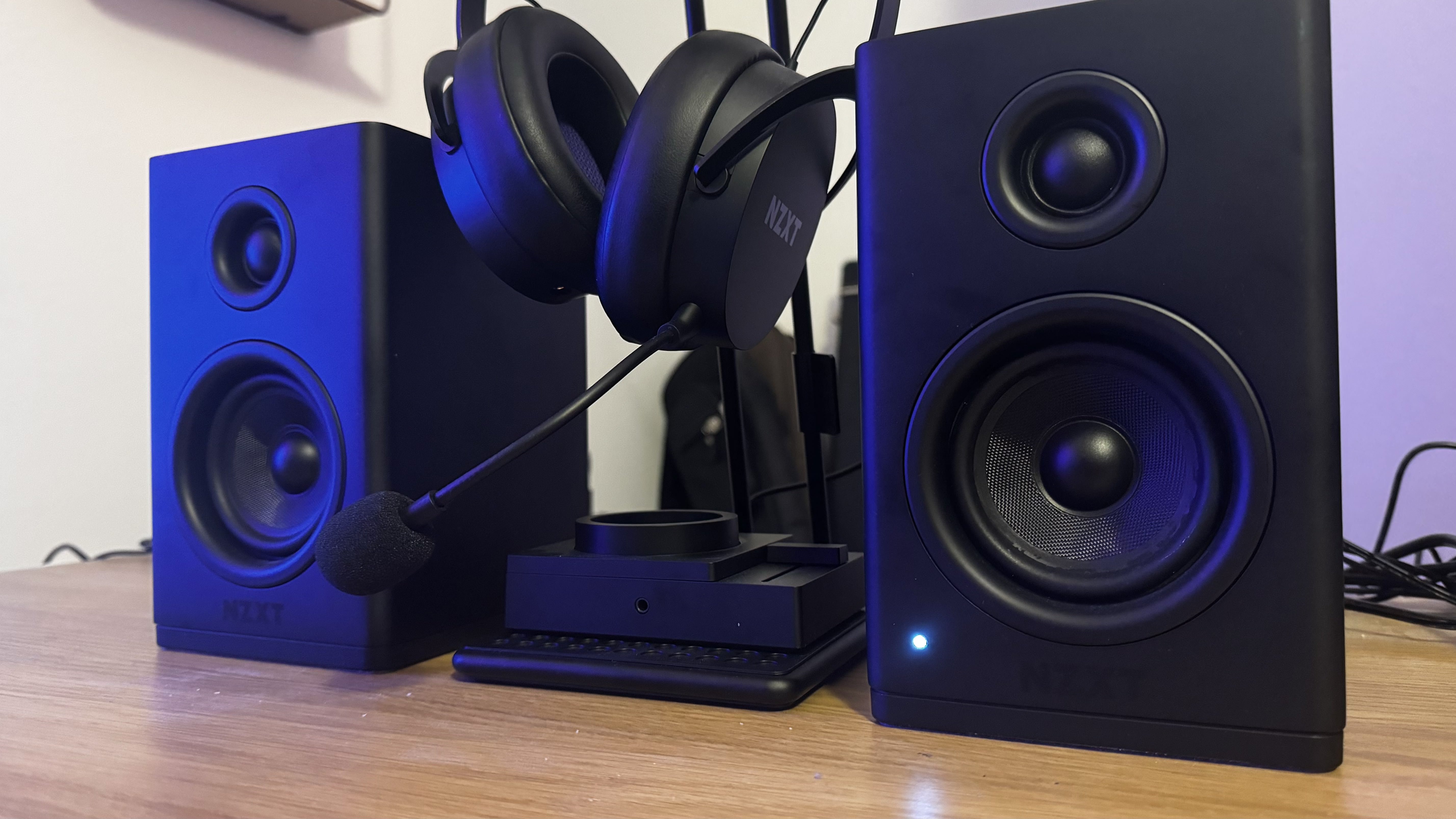
The NZXT Relay is a wonderful bit of kit that is far superior to the sum of its rather messy parts.
There’s a certain mystique to running a speaker cable into a terminal and producing a sound in another speaker—a mixture of audio wizardry and almost pure magic. You plug it in and get that nostalgic hit of real sound. The floor under you shakes and…suddenly, you are hit with the sound of Mike Myers “hitting the griddy” in a battle royale with 99 other people. Isn’t technology wonderful?
Though I’m being hyperbolic here, our relationship has changed with speakers culturally over the last few decades. No longer your only way to get sound from a device, they have fit into a more “audiophile” niche — from a last resort to a first choice. The NZXT Relay embodies that audio wizardry in just how wonderful the full setup is, but new ideas almost always come with growing pains and there’s a lot of those here.
Let’s talk about that wizardry first, as it’s the most unique thing about these speakers. Though you can buy the speakers by themselves, the NZXT Relay set works at its best when you purchase the subwoofer, headphones, and Switch Mix stand.
Essentially, that stand has a button at the top that flicks from speaker to headphones, depending on the weight. This means you can hang up your headphones on the stand and it will automatically switch to speaker mode. Take them off and you’ve got sound in your headphones.
This works near instantaneously and, no matter how fast I tried, I could never get the headphones on my head before it started playing my sounds. This is, admittedly, a dumb test, but also a good sign of how consistent that switch is.
The speakers themselves are small and look very tidy on a desk. Mids and highs sound great and feel very well balanced, so Darwin Deez’ geeky breakup anthem ‘DNA’ sounds as it should, thanks to those jangly guitars. However, Lucy Dacus’ equally clever, yet heart wrenching breakup tune ‘Nightshift’ loses a lot of its raw power due to a lack of bass. When the song all comes together and Lucy’s vocals roar at you, the speaker doesn’t.
NZXT’s speaker gets the tone of a bass but none of the feel. There isn’t a rumble—no shake to be found.
The same can be said of in-game audio performance. The depths of the Nightingale character creation screen don’t quite hit as expected but that high orchestra is still quite impactful. Balatro, the video game manifestation of an earworm, has managed to get the most time out of this speaker, and its chill synth-driven theme mostly fares well.
(Image credit: Future)
If you’re looking to play a shooter and get the real feel of bass as your boots stomp on the ground and helicopters fly above, you will want something that has more of a boom to it. However, this fared better in more dialogue-intensive moments than the likes of the rather over-the-top Razer Nommo V2 Pro.
What the speakers do well is how balanced the rest of the sound feels. If you can get a dedicated bass source, like the aforementioned subwoofer, the mids, and highs sound great tonally and manage to stay similarly at the forefront of the sound. I never felt like the high-pitched sound of a flashbang fully drowned everything out, instead momentarily taking the spotlight as it should.
Though there’s no Bluetooth option, the speakers can be plugged in via RCA or 3.5mm aux, which is a reasonably diverse grouping of connection options. This means it can be plugged into a PS5 via the Dualsense 3.5mm port and, though it is a little limited thanks to the wire, performs great.
The speakers do turn off after a while without using them, which can be a bit annoying, and it doesn’t seem to have the ability to pick up when sound is coming from the PlayStation. This means, after a while, it will shut off and come back alive randomly on console—a minor annoyance.
(Image credit: Future)
The NZXT Relay headset is mostly a decent companion to the rest of the Relay. It can be connected with a simple 3.5mm aux jack, is super comfy, and has a very good microphone for the price range.
Buying the NZXT speakers without picking up its accessories is like buying a 4K capable 4090, and using your mum’s old monitor.
Unfortunately, the headset takes after the speakers in the fact they have decently clear mids but very poor bass. It almost feels like listening through a pair of earphones — they have no rumble but are very convenient.
(Image credit: Future)
The Switch Mix is the linchpin in the NZXT Relay set and it shows in that whopping $130 price tag. As well as being a headphone stand, with that really cool ability to swap between speaker and headphones, it comes with a slider for fading between in-game sound and voice chat, as well as a volume mixer for adjusting and shutting off the sound altogether.
✅ You like to switch from speakers to headphones: The NZXT Relay set is wonderful for when you want to use both headphones and speakers but a bit of a waste if you don’t.
✅ You want a unique setup: I haven’t felt the distinctive joy of messing around with the NZXT Relay with any other set of speakers out there. These are great for wowing a friend.
✅ You need everything: If you’re looking for a new subwoofer, speaker, and headphones, the entire set is really great.
❌ You already have dedicated headphones: Though any pair of headphones can work with the switch mix, it needs to have an aux jack port to fit into the whole ecosystem.
❌ You’re on a budget: The speakers themselves are very reasonably priced but it’s not a set you buy just the speakers for. The rather great Kanto Ora is a bit more costly than the speakers but way less than the full set.
❌ You care a lot about bass: Even at its most bassy, the NZXT Relay has passable bass. You can feel the rumble, but it won’t shake your room.
The only non-essential part of this setup is the headphones, as any other pair with a 3.5mm jack can fit in the switch mix and are able to activate the button on top. Everything works very well, but one small issue I came across involves the swap between volumes.
If you have your set of speakers quite low and your headset sound very high, it will blast with less than a second of sound into your speakers as you swap over. Finding a good balance of volumes fixes this but it can be a problem if you want to blast your headphones but only play quietly from the speakers.
If you pick up NZXT’s subwoofer to make up for the noticeable lack of bass, it will serve you well but lacks the huge volume of the speakers. NZXT’s speakers constantly sit at just under half the max volume and this works perfectly for my room, yet I have to crank the subwoofer to the max to really match the two sounds. This is a strange oversight that means raising the volume of everything will leave the highs and mids standing out above everything else.
Buying into the NZXT speakers without picking up its accessories is like buying a 4K capable 4090 behemoth, and using your mum’s old monitor. It’s still going to be a good experience but you’ve spent all this money now – you might as well commit to that extra upgrade.
The speakers themselves are surprisingly compact, look great, and connect relatively easily. You just need some bass to really get things going.
The subwoofer does provide some bass but the volume is low enough to need something extra. The headset is decent for the price but only really makes sense if you get the smart headphone stand. When everything comes together, it’s a real joy to go from listening out loud to talking to friends, yet one missing piece and it all falls apart.





